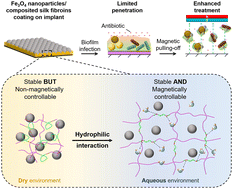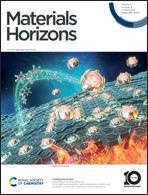Composited silk fibroins ensured adhesion stability and magnetic controllability of Fe3O4-nanoparticle coating on implant for biofilm treatment†
Abstract
Magnetic propulsion of nano-/micro-robots is an effective way to treat implant-associated infections by physically destroying biofilm structures to enhance antibiotic killing. However, it is hard to precisely control the propulsion in vivo. Magnetic-nanoparticle coating that can be magnetically pulled off does not need precise control, but the requirement of adhesion stability on an implant surface restricts its magnetic responsiveness. Moreover, whether the coating has been fully pulled-off or not is hard to ensure in real-time in vivo. Herein, composited silk fibroins (SFMA) are optimized to stabilize Fe3O4 nanoparticles on a titanium surface in a dry environment; while in an aqueous environment, the binding force of SFMA on titanium is significantly reduced due to hydrophilic interaction, making the coating magnetically controllable by an externally-used magnet but still stable in the absence of a magnet. The maximum working distance of the magnet can be calculated using magnetomechanical simulation in which the yielding magnetic traction force is strong enough to pull Fe3O4 nanoparticles off the surface. The pulling-off removes the biofilms that formed on the coating and enhances antibiotic killing both in vitro and in a rat sub-cutaneous implant model by up to 100 fold. This work contributes to the practical knowledge of magnetic propulsion for biofilm treatment.



 Please wait while we load your content...
Please wait while we load your content...